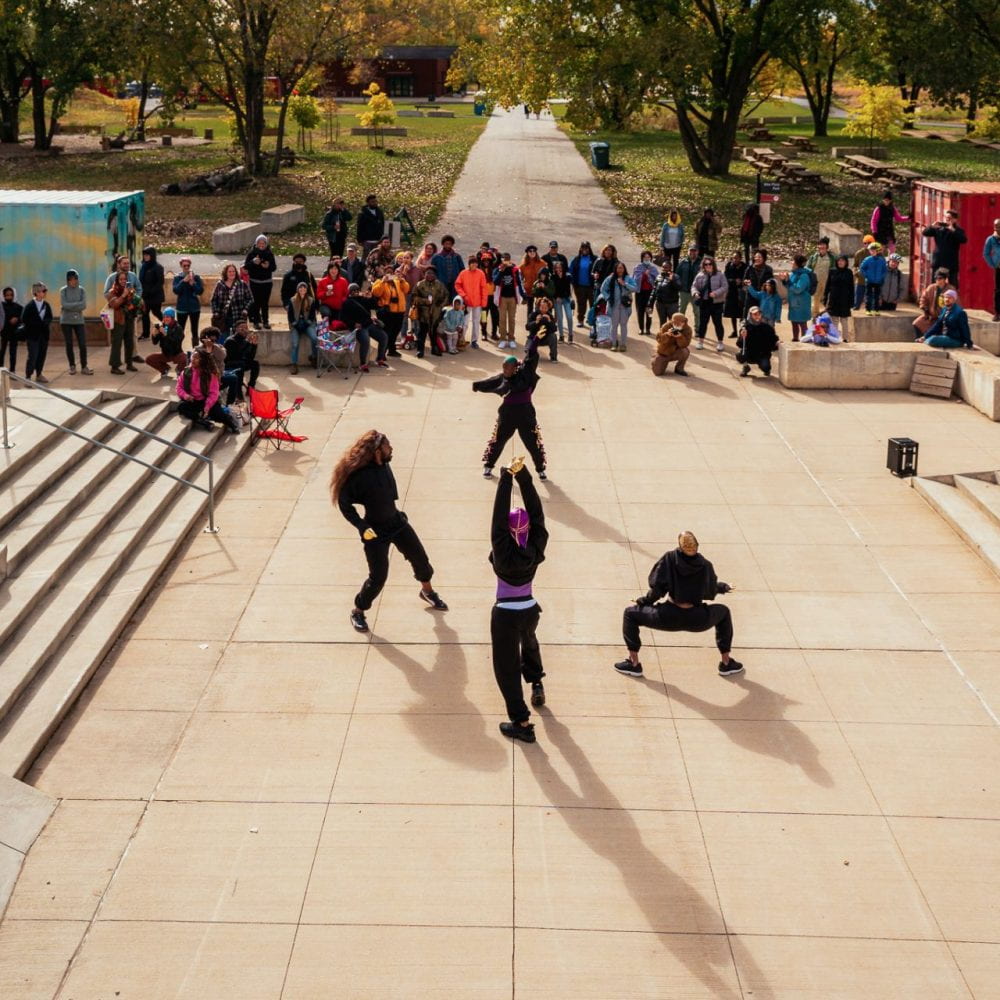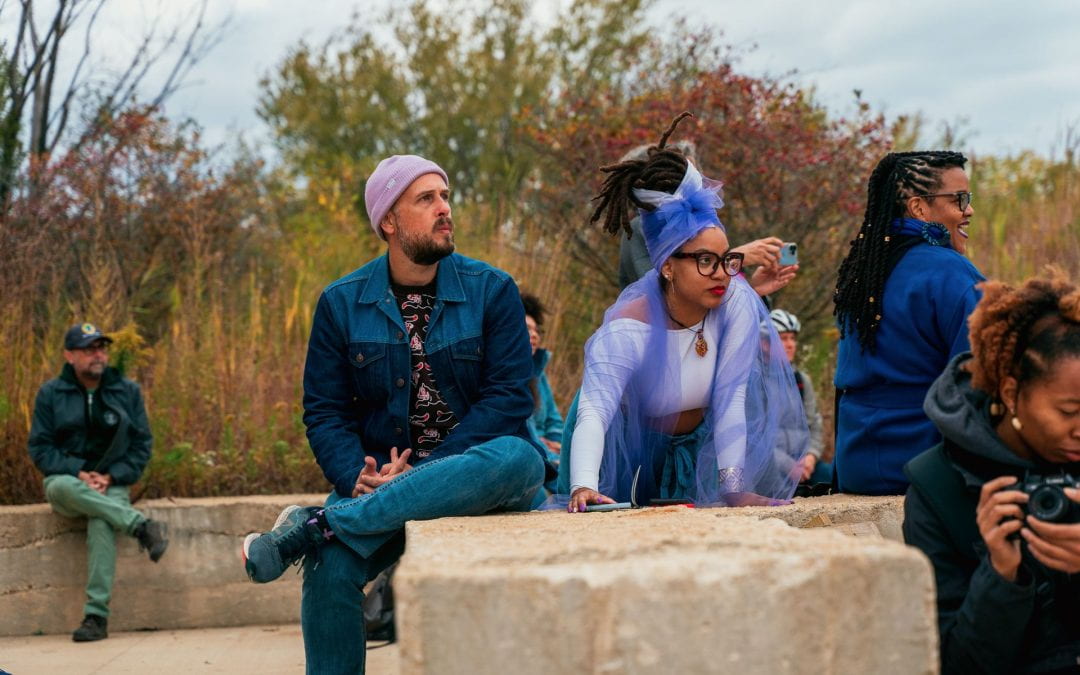Born in Ruston, Louisiana and raised across Louisiana, Maryland, and Texas, Aaliyah Christina creates and supports performance work as an administrator, curator, movement artist, and writer. She improvises dances and writes poetic-prose about relationship/power dynamics, mental health, and Blackness as a resident on the South side of Chicago. Since 2015, she has collaborated with Chicago artists like Keyierra Collins, Ysayë Alma, Darling Shear, Wisdom Baty, Ayako Kato, and Dorian Sylvain to name a few. In 2021, Aaliyah received the 3Arts Make-A-Wave grant and as of 2023, she received the Illinois Arts Council Agency 2023 Artist Fellowship Finalist Award. She volunteers for community orgs and campaigns including Assata’s Daughters and Defund CPD to move towards Black liberation. Under her direction, PRAISE MOTHER is in-development as a community initiative and dance theater project highlighting stories of relationships between Black matriarchs and their kin through their mental health journeys.
I am Aaliyah Christina. I’m a dancer, dancemaker, improviser, collaborator, writer, and arts administrator. I’m a resident on the south side of Chicago and a southerner. I was born in Ruston, Louisiana and grew up in multiple places, mostly Upper Marlboro and Waldorf, Maryland, as well as Houston, Texas.
Growing up I dreamed of going to an HBCU–I wanted to go to Grambling State University like the rest of my family. Grambling was right outside where I was born, and I had a plan to dance with their Orchesis Dance Company. They perform at all the football games. It was a huge dream of mine to perform at the Bayou Classic, which is an annual football game between Grambling State and and Southern University in New Orleans every year. The first time I went was for my seventh birthday, which is always around Thanksgiving weekend.
I knew I wanted to work in dance, but most HBCUs didn’t have a dance degree. I found the Dance Center at Columbia College just googling schools in Chicago–I graduated in 2016 and also minored in fiction writing. I’ve been in Chicago about 11 years now. I fell in love with the city and the arts that were going on at the time. When I graduated I dove more into the queer community here—I identify as graysexual, it’s on the asexual spectrum. Chicago feels like the only place that would accept me as I am–a Black femme who wears her hair the way I do–Chicago was the first place that was like, “Be who you are.” I thought I wanted to be a choreographer, but as I went through school I started to develop a love for curation and supporting other artists, especially Black dance artists. Now I have curated professionally with Chicago Dancemakers Forum, Links Hall, Red Clay, and the Fly Honey Show.
I have lived on the south side for seven years now. I moved to South Shore at the top of 2022. I was in Washington Park for 5 years before that. I like the south side. South Shore is a very friendly neighborhood. It reminds me of the South. You walk down the street and people say, “Hi, how are you doing?” Washington Park was not like that–it was quiet, desolate, also a food desert—you had to leave the neighborhood to go shopping. South Shore is vibrant, colorful, Black.
The only thing that stunts me about South Shore is the police presence. They are everywhere, on every corner, especially after dark. The point is for them to make things feel safe, but they don’t. I am a deep abolitionist. Historically the south and west sides of Chicago have been heavily policed. They talk about the gun problem, the drug problem, violence, while also removing resources from these communities. When there’s a food desert or a lack of schools or housing and food are insecure, violence happens. People get angry or irritable, they react versus respond. The police, they react versus respond. So when you combine those two things, it’s a volatile experience for the people. Police are heavily armed, they have all the power. So the people who are feeling angry about their material conditions, they don’t have a way to express that healthily. You have these soldiers to whip them into shape versus taking care of them and making sure they have the resources to survive and thrive.
I grew up in predominantly Black communities. After middle school we moved to a suburb of DC. The police presence wasn’t so high. There were a lot of resources to go around for everyone. Coming to Chicago, witnessing the segregation of the city, and the disparity of wealth was a culture shock, even though I grew up with my mom, a single mom, until I was in middle school. The segregation, the brutality, and being around white people was all a culture shock.
I would love for Brandon Johnson to deliver on his campaign promises. I would love for the police budget to disintegrate. I would love for people to be fed every day. I would love for housing to be secure and affordable for everyone. Luxuries should be luxuries, and necessities should be available no matter what. I would love to get healthcare for myself and everybody who needs it. As a part-time arts worker and a full-time artist, I do not have healthcare–I can’t afford it. I have to pay my rent, I have to buy groceries. I made too much for social benefits in the last year, so I can’t take advantage of benefits anymore. It would be great to have our basic needs taken care of by the people who say they care. I dream of self-determination for Black and Indigenous people to say, “We don’t need to rely on the government; we can rely on ourselves.” I dream of conditions that can make that possible.
My project PRAISE MOTHER arose from lost dreams. I’ve created this work about mental health with Black single parents and their children, and how that affects and impacts your mental health when you have lack of funds and access and resources, especially for single mothers with postpartum depression and medical racism and relationship woes and an an absent parent that doesn’t want to be present, or is manipulative or narcissistic and unable to assist you with taking care of your child. It’s me spilling my guts about me and my mom’s relationship before and after she got married. My stepdad was a great coparent, but I relied mostly on my mom. My father was in a different state and wasn’t always available to me. So this work is about grappling with that and finding camaraderie in others with that same experience, or who have both their parents but one is not as supportive as they should be. This project is also about motherhood: choosing motherhood, choosing not to be a mother, mental health, depression, anxiety, abortion, how that can impact how you interact with others, gendered violence, and religious indoctrination. I’ve developed a squad of dancers to convey this message.

Photo by Ricardo E. Adame
We’re going into rehearsals at the University of Chicago at the Chicago Performance Lab July 12 to August 24 to dig a little deeper into these experiences. I do that in the majorette dance style that was developed at HBCUs. We study the majorette style from the squads in the SWAC, the Southwestern Athletic Conference, the conference I grew up watching and experiencing: Grambling State’s Orchesis Dance Company, Jackson State’s Prancing J-Settes, Alcorn State University’s Golden Girls, the Southern University Dancing Dolls. We’re creating playlists with their footage and listening to music from the bands, exploring our sexuality and our synchronicity with each other: how are we hearing each other and feeling each other and connecting with our lineage, the Black church and spirituality, and how we worship or praise through liturgical dance? How do we revolt, uprise, and connect with each other through our trauma and healing? Hopefully we’ll have a full stage production summer or fall 2024. I would love to tour it, especially at HBCUs, because it is an homage to them, and an exploration of Black southern life and the life of migration.
Top image by Ricardo E. Adame

